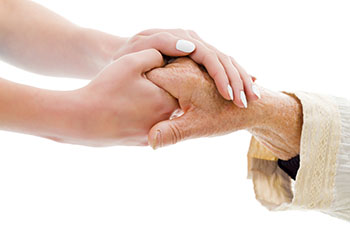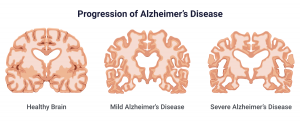What is Alzheimer’s Disease and what are the symptoms
Did you know more than five million Americans are living with Alzheimer’s? It is also the sixth leading cause of death in the United States (Alzheimer’s Association, 2021). Alzheimer’s disease is a progressive disease that affects memory loss and other cognitive disabilities. The symptoms include: “Memory loss that disrupts daily life, challenges in planning or solving problems, difficulty completing familiar tasks, confusion with time or place, trouble understanding visual images and spatial relationships, new problems with words in speaking or writing, misplacing things, poor judgment, withdrawal from work or social activities, and changes in mood/personality.” (Alzheimer’s Association, 2021).
Past, Present, and Future of the disease
Alzheimer’s Disease: Past, Present, and Future by Mark W. Bondi (1), Emily C. Edmonds (2), and David P. Salmon (3). The author’s describes Alzheimer’s Disease in the past by describing the Alois Alzheimer and Auguste Deter. Alois was the first person to discover the neurodegenerative disease in 1907 and Auguste was the first patient to show symptoms of the disease. When Auguste died, Alois studied her brain and was able to sketch what he saw inside of the brain onto paper. The authors then begin to describe Alzheimer’s disease in the present time. As studies have been proven, technology has advanced, and more and more individuals have been studying Alzheimer’s disease more information has been discovered. The findings were that Alzheimer’s is a decline of general knowledge and there are severe deficits in executive functioning. There are many studies done to prove genetic risks for Alzheimer’s Disease. Biomarker studies, neuropsychology, and neuro imaging have been a large impact on the study of Alzheimer’s Disease and the connection to the human brain. There has been so much progress in the Disease itself. In the future, there will be a new medicine approach that will detect pathologies and genetic analysis. If you look back, we have come a long way with researching and finding information about this disorder.
Is There a Cure?
Unfortunately, science has not come out with a cure for the disease. Alzheimer’s Disease: Diagnosis and Treatment Across the Spectrum of Disease Severity by Judith Neugroschl and Sophia Wang. The article talks about how Alzheimer’s disease happens in a spectrum going from mild symptoms to death. Alzheimer’s Disease is a progressive, difficult disease for the individual, their family, and caregivers. Down below shows a picture of what a healthy brain would look like, a brain with mild Alzheimer’s disease, and severe Alzheimer’s disease.

Communicating with an individual diagnosed: Do’s & Don’ts
Communicating with someone that is diagnosed with Alzheimer’s disease can be very difficult due to their cognitive impairments. Are you supposed to correct them? What do you say?
DO’s: “Avoid becoming frustrated, keep communication short and simple, call them be their first name, always tell them who you are, use repetition, use techniques to attract and maintain attention, and speak slowly” (Robinson, 2020).
DON’Ts: Never say phrases such as “do you remember?” or “did you forget?”, talk in paragraphs, point out the person’s memory difficulty, talk in front of the person as if they weren’t present, use lots of pronouns, slang or unfamiliar words, “baby talk”, or sarcasm” (Robinson, 2020).
Hat’s Story: What is it like living with Alzheimer’s Disease?
Alzheimer’s Association Helpline 24/7 : (800-272-3900)
References:
Bondi, M. W., Edmonds, E. C., & Salmon, D. P. (2017). Alzheimer’s Disease: Past, Present, and Future. Journal of the International Neuropsychological Society : JINS, 23(9-10), 818–831. https://doi.org/10.1017/S135561771700100X
Neugroschl, J., & Wang, S. (2011). Alzheimer’s disease: diagnosis and treatment across the spectrum of disease severity. The Mount Sinai journal of medicine, New York, 78(4), 596–612. https://doi.org/10.1002/msj.20279
Robinson, Lawrence. “Tips for Alzheimer’s and Dementia Caregivers.” Tips for Alzheimer’s and Dementia Caregivers – HelpGuide.org, 2020, www.helpguide.org/articles/alzheimers-dementia-aging/tips-for-alzheimers-caregivers.htm.
© 2021 Alzheimer’s Association® | All Rights Reserved | Alzheimer’s Association is a not-for-profit 501(c)(3) organization.

I enjoyed reading your post. I think it contained invaluable information to those who may have a loved one recently diagnosed. I liked that you covered the who, what, when, and how of the disorder. I would have loved to see some information on things you can do for/ with your loved one to help maintain their independence/ cognition. Overall a very good blog.
Hi Grace,
I love your topic, as Alzheimer’s Disease hits close to home in my family. I really like how you touched on the past history of AD and where it is heading now with research. I also appreciate your “Do’s and Dont’s” for communicating with someone who has AD. Many people can learn and benefit from information regarding how to communicate effectively with someone who has Alzheimer’s. Your media clip offers an honest and emotional personal look at AD. Great job!
Michele M.